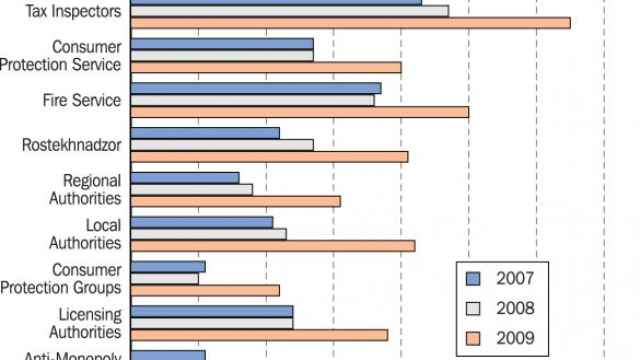Russian businesses feel increasingly hampered by the work of state agencies, with tax and fire safety inspectors taking the prize for most disruptive, according to a survey released Tuesday.
Reducing the regulatory and bureaucratic burden on businesses has been a key goal of Dmitry Medvedev's presidency. But despite a recent decline in the number of inspections from some agencies and pressure from above to clean up what Medvedev has called a "corrupt" and "ineffective" bureaucracy, businesses are growing more and more disenchanted.
Over the three years that the survey has been conducted, regulators have seen their scores continue to fall, with all agencies getting an average 3.33 points out of the possible 7 in 2009, down from 3.73 in 2007.
The survey, conducted by state pollster VTsIOM in 2009, asked 1,200 business owners and managers to rate the performance of the state agencies regulating businesses.
Tax authorities were the biggest source of problems, according to the survey, with 65 percent of Russian businesses saying they hindered their work. The fire inspection service was next in line, with an even 50 percent of businessmen crying foul.
Frequent inspections by oversight agencies and regional administrations continued to bother entrepreneurs during the crisis year. Thirty-three percent of the surveyed entrepreneurs pointed to excessive paperwork as their main concern during inspections, and 30 percent said such inspections prompted bribes.
 Percentage of respondents saying the body either somewhat or seriously interfered with their businesses.
Percentage of respondents saying the body either somewhat or seriously interfered with their businesses.
Source: VTsIOM
Other targets of businessmen's ire included the Federal Service for Environmental, Technological and Atomic Inspection, or Rostekhnadzor, and local authorities, who hindered 41 percent and 42 percent of respondents, respectively.
The Federal Tax Service said it hadn't yet studied the survey but that its bad score was probably largely because of the financial crisis.
"The crisis hit the hardest in 2009 when the second survey was conducted. Companies cut down expenses everywhere they could but taxes obviously remained the same, hence the attitude," a spokeswoman for the tax service said.
The spokeswoman added that the service had carried out fewer inspections in 2009 in response to Medvedev and Prime Minister Vladimir Putin's requests to take it easy on businesses during the crisis year.
A Message from The Moscow Times:
Dear readers,
We are facing unprecedented challenges. Russia's Prosecutor General's Office has designated The Moscow Times as an "undesirable" organization, criminalizing our work and putting our staff at risk of prosecution. This follows our earlier unjust labeling as a "foreign agent."
These actions are direct attempts to silence independent journalism in Russia. The authorities claim our work "discredits the decisions of the Russian leadership." We see things differently: we strive to provide accurate, unbiased reporting on Russia.
We, the journalists of The Moscow Times, refuse to be silenced. But to continue our work, we need your help.
Your support, no matter how small, makes a world of difference. If you can, please support us monthly starting from just $2. It's quick to set up, and every contribution makes a significant impact.
By supporting The Moscow Times, you're defending open, independent journalism in the face of repression. Thank you for standing with us.
Remind me later.

